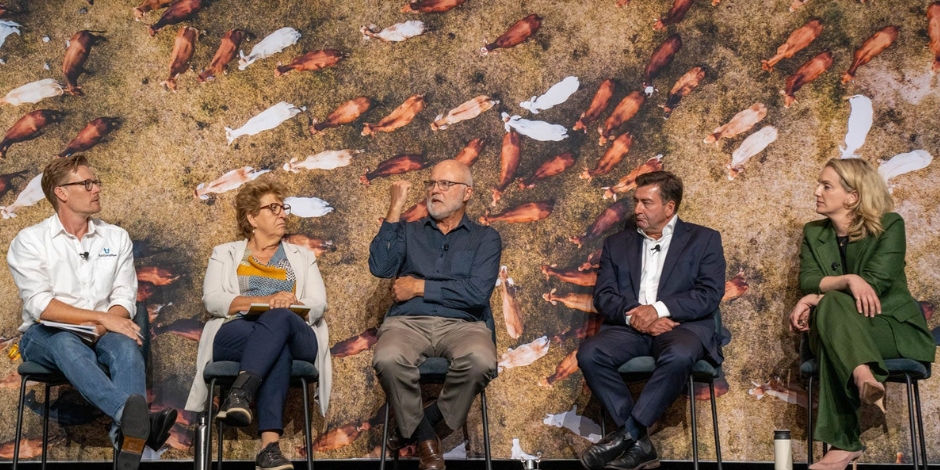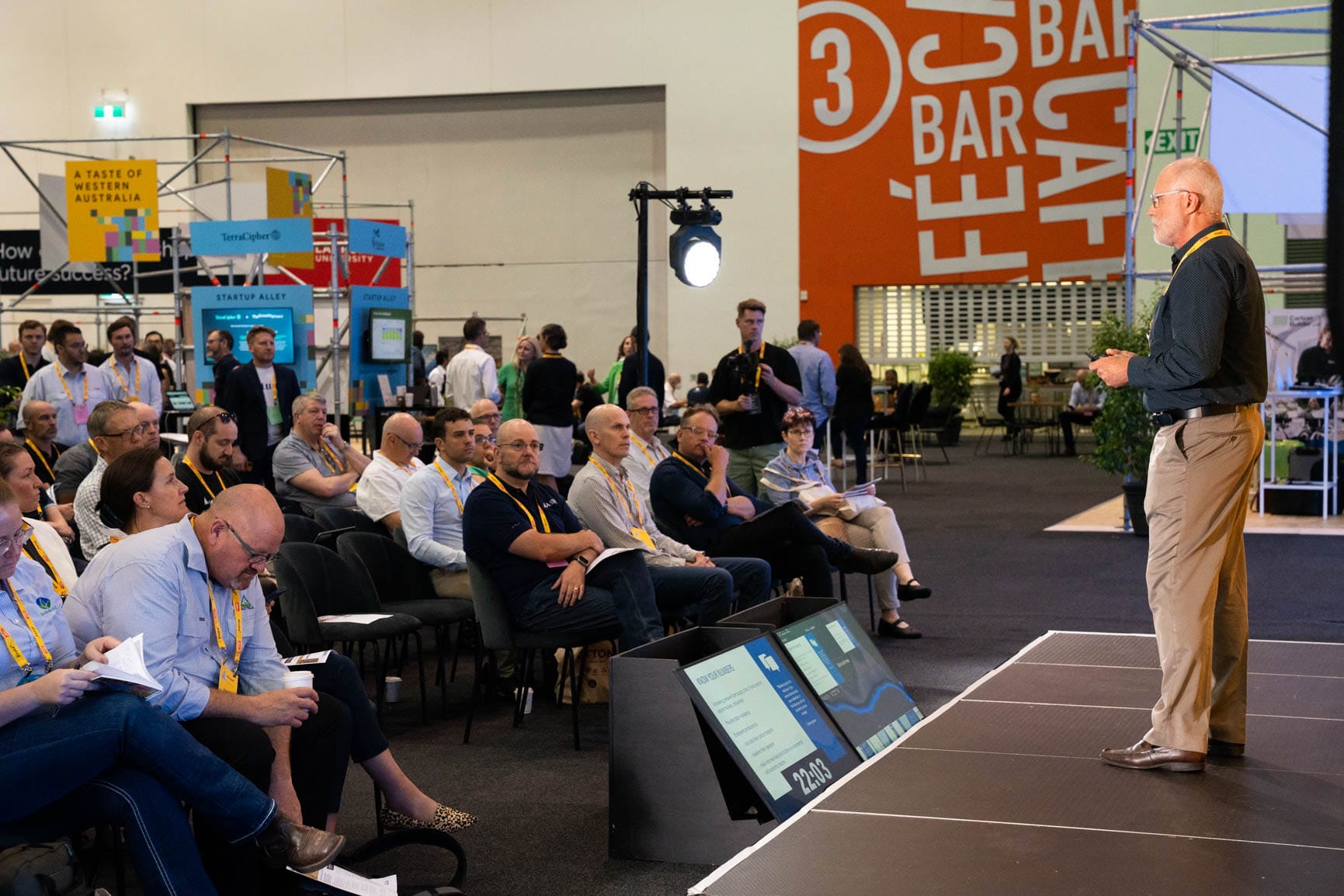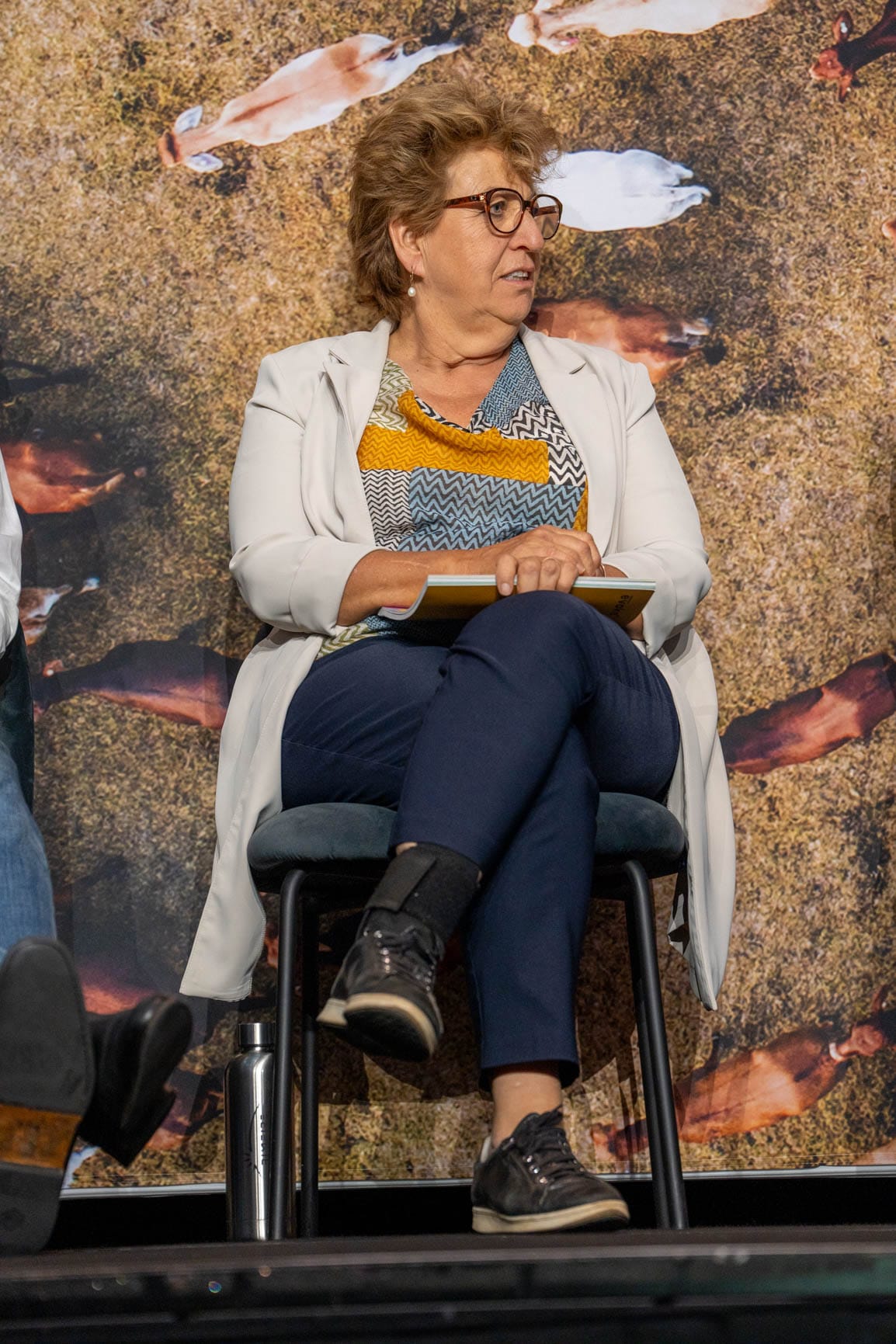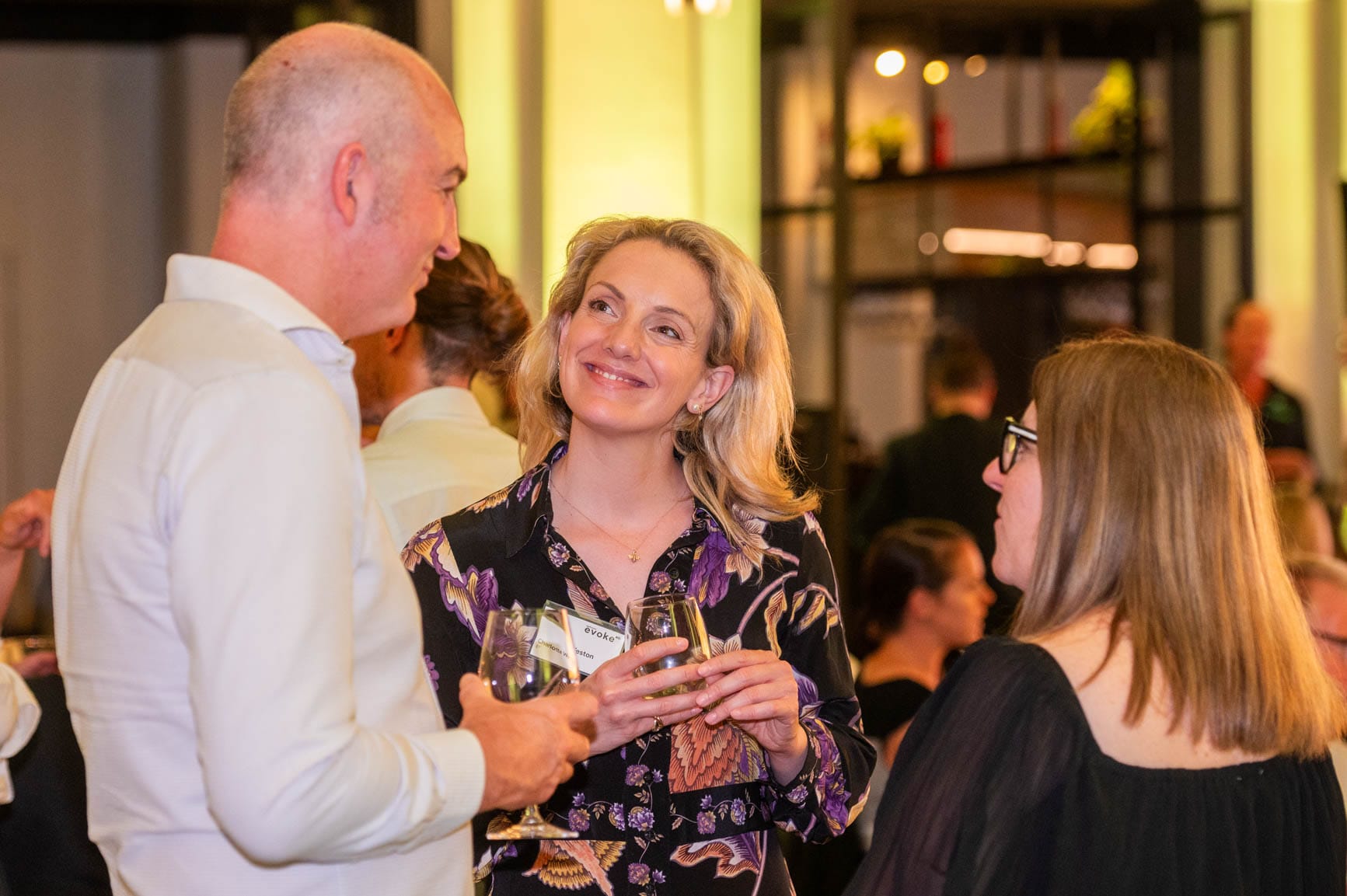Five truths we need to spur Australia’s agrifood producers into faster action on carbon
Carbon is the currency of modern agriculture, so it’s no surprise that attendees at AgriFutures evokeAG. 2024 were keen to know how Australia’s ag sector can overcome its stubbornly slow adoption of low-carbon solutions. As we hurtle towards 2030 (D-Day for most decarbonisation pledges both in Australia and internationally) market and regulatory pressures to reduce GHG emissions are bearing down upon the agrifood supply chain. Despite the urgency to respond, Australian producers aren’t yet flocking to low carbon production.
Here, top academics, early adopters, and sustainable livestock feed innovators share their truths on why adoption is lagging, and how we can drive faster progress.
 Jackson Hewett, Head of Content, AuctionsPlus (far left) facilities a panel discussion at evokeAG. 2024 with Jacqui Biddulph, Director, Kerridge Farm, and Steering Committee Member, Australian Dairy Sustainability Framework; Professor Richard Eckard, Professor, University of Melbourne; David Messina, Co-Founder and CEO, Rumin8; and Charlotte Weston Global Sustainability Director, EY, and Expert Advisory Board, The Earthshot Prize. Image | Mr.Wigley Photography.
Jackson Hewett, Head of Content, AuctionsPlus (far left) facilities a panel discussion at evokeAG. 2024 with Jacqui Biddulph, Director, Kerridge Farm, and Steering Committee Member, Australian Dairy Sustainability Framework; Professor Richard Eckard, Professor, University of Melbourne; David Messina, Co-Founder and CEO, Rumin8; and Charlotte Weston Global Sustainability Director, EY, and Expert Advisory Board, The Earthshot Prize. Image | Mr.Wigley Photography.
Truth #1: We should be listening to markets – not waiting for regulators
It’s almost 20 years since Professor Richard Eckard developed Australia’s first carbon accounting tools. The Director of the University of Melbourne’s Primary Industries Climate Challenges Centre recalled that time when no one much cared about their carbon balance.
“Now, it’s in vogue,” he observed.
“But what matters most is who’s asking?
“Of the world’s 100 largest economies, 69 are companies – not countries. The emissions targets of these companies, who appeal to shareholders and the future consumer, are actually what’s driving this.
“The most efficient farmers today have the lowest emissions intensity and would be at the head of the queue in meeting supply chain targets by 2030.
Most pledges commit companies to a 30% reduction in CO2 equivalent by 2030.
“And as a 70% export-focused sector, Australia should be more cognisant of how those companies are going to implement their target,” said Richard.
While the domestic market for low carbon products is still a little akin to pistols at dawn, with both producers and buyers somewhat reluctant to make the first move, Richard explained we can learn from early patterns appearing internationally.

Professor Richard Eckard, University of Melbourne.
“We have some insights into how the supply chain will start buying. What we already see is they are getting carbon audits done on their supplier farms, ranking them from lowest emission overhead to highest. Then, they start buying from the low end, because otherwise they’ve got to buy carbon credits to meet their target.”
One thing is clear: if Australian farmers want to go on the journey with their supply chain partners, we need to know our carbon balance. And get us on the right side of the ledger.
Truth #2: Don’t be scared to baseline. It’s probably better than you think
Western Australian dairy farmer, Jacqui Biddulph, wants fellow producers to know that commercial viability and decarbonisation can co-exist.
“I’ve had a lifelong interest in sustainability, but from the point of view that we’re in business,” explained Ms Jacqui.
“So, I’m interested in technology that’s going to make us money, and ensure we have a business that transitions happily from year to year.”
For the six years she’s been measuring, Jacqui’s emissions have steadily declined – due in part to a focus on what she calls the ‘easy wins.’
“We know that 60% of our farm emissions are methane, leaving 40% that aren’t. So, until technologies are commercially available that offer outcomes for livestock grazing industries, we’ve focused our efforts – targeting carbon emissions avoidance – on things like energy recovery systems for cooling milk and converting stock water pumps to solar.”

Jacqui Biddulph, Director, Kerridge Farm. Mr.Wigley Photography.
Her take-home message to producers on the fence about baselining? Don’t be scared to measure.
“If you’re a competent producer and you’re managing real resources – be it land or rain or grain – if you can turn out more product per unit of resource that you put in, you’ll have a lower carbon number.”
“One of the things I’ve learned as I deal with more people who are looking at their carbon number is, they’re actually really surprised at how good they are already doing.
Truth # 3 Ruminants took 50 million years to evolve to a steady state of producing methane. We’ve got six years to do something about it
Producers like Jacqui are right to consider methane a harder nut to crack, but as an undeniably big contributor to agricultural emissions, livestock industries can’t keep it in the ‘too hard basket’ for much longer. Is red asparagopsis the silver bullet livestock producers need?
Sustainable feed innovator, Rumin8, has spent the last few years in deep research and development addressing the key constraints limiting commercialisation. It’s now on track to bring products to market which confidently target up to an 85% reduction in methane emissions, and a 5% increase in productivity.
But CEO and Co-Founder, David Messina, knows it’s just one part of the suite of responses needed.

Rumin8 CEO and Co-Founder, David Messina. Image | Mr.Wigley Photography.
“Northern Australia and Tasmania and New Zealand and Brazil: these different places have different animals and different grazing systems, so they all need slightly different solutions,” he said.
He pointed to feed additives, breeding solutions and other interventions currently in development which will play out commercially over the next decade.
“The benefit Rumin8’s technology, is that we can have an impact in a relatively short time, buying time for that second generation of technology to come through.”
Truth # 4: Turning commitments into action is key for finance
COP28 created a fervour of enthusiasm for the global agrifood sector, with billions of dollars committed to transforming food systems, and the Declaration on Sustainable Agriculture, Resilient Food Systems and Climate heralded as a global shift in approach. But mobilising climate finance is complicated and often slow, should we be concerned about the time this will take for primary producers to feel the benefits?
David is remaining confident.
“These big global processes – which involve big companies and require a lot of consultation – simply take time,” he said.
So, if ag hasn’t fallen off the agenda, can we hope that real progress is around the corner? Charlotte Weston, Global Sustainability Director, and member of the Earthshot Prize’s Expert Advisory Panel, thinks so.
“The increase in commitments at COP was seen as significant and positive. Over 150 countries signed up to the Declaration, including Australia, together representing over 80% of global agriculture’s GDP. But to give confidence to business, this needs to lead to a set of global policies that will enable and support sustainable agricultural and food systems.” she said.

Charlotte Weston, Global Sustainability Director, and member of the Earthshot Prize’s Expert Advisory Panel at the evokeAG. 2024 Culinary Capital event. Image | Mr.Wigley Photography.
Charlotte highlighted the shift in discussions to focus on the role agricultural sector can play in climate solutions, including through carbon sequestration and nature-positive production systems.
She explained that mobilising transition finance was essential to support producers and growers and to achieve systems change – including scaling investment and the creation of new blended finance models, alongside providing education and support and on farms to ‘empower people to have the right data, own their data and engage with the opportunities.’
“We can be hopeful that this will drive change,” she said.
Truth #5: We have an unhealthy reliance on carbon offsetting
Richard knows that the policies and frameworks put in place to enact agreements like the COP28 Declaration will have a material impact on how much good we actually achieve. But he’s concerned that Australia has an unhealthy reliance on tree and soil sequestration offsets, which enable emitters to buy their way out of real emissions avoidance.
The reason why simply comes down to incentivisation. He explained, “Australia is one of the largest government-regulated carbon crediting schemes globally. But carbon offsets were only historically meant to be an emergency reserve mechanism; it was never meant to be a first line defence.”
“We know that carbon sequestration is a finite account. Trees eventually do stop sucking up new carbon, and carbon saturation in soil is a real issue. Far better if we just get the emissions avoidance solutions right – with offsetting as our backup plan.
For livestock producers, Richard explained that might mean selling your animals three months early for market.
“That’s three months of methane they simply didn’t produce. You could repeat that year after year and inset that credit against your own farm carbon balance to access your supply chain,” he said.
“Emissions avoidance is not like offsetting. You can lose carbon in the soil, and you can lose carbon in trees. But once you’ve reduced methane and sold the animals early, there’s no reversal on that.”
Jacqui Biddulph, Director, Kerridge Farm, and Steering Committee Member, Australian Dairy Sustainability Framework; David Messina, Co-Founder and CEO, Rumin8; Professor Richard Eckard, Professor, University of Melbourne; and Charlotte Weston Global Sustainability Director, EY, and Expert Advisory Board, The Earthshot Prize, were part of panel discussion ‘Leaders and Laggards: Pathways to a more sustainable landscape’ at AgriFutures evokeAG. 2024. The discussion was facilitated by Jackson Hewett, Head of Content, AuctionsPlus.
For more inspiration about how agrifood tech can help make our food supply chains more sustainable and profitable sign up for updates from evokeAG.
